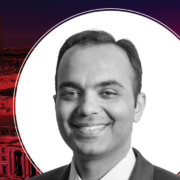Rohit Chopra on new mortgage servicing rules, Basel III and the CFPB’s funding
Consumer Financial Protection Bureau (CFPB) Director Rohit Chopra expects that servicing rulemaking will be issued in the coming months modeled on the lessons learned through the COVID-19 pandemic.
“I do anticipate that in 2024 we will propose some amendments to the mortgage servicing rules that are reflective of what we learned through the pandemic,” Chopra said on Monday morning to an audience of mortgage professionals.
According to Chopra, the amendments’ “bullseye” would be to “create flexibility” to the rules, but “without undermining the core consumer protections that people have in the process of evaluating an alternative to foreclosure.”
Chopra spoke during the Mortgage Bankers Association (MBA) Annual Conference held Oct. 14-17 in Philadelphia. He answered questions raised by Bob Brokesmit, president and CEO of the MBA.
Much of the conversation touched on the Basel III proposed rules.
The Federal Reserve, Federal Depository Insurance Corporation (FDIC) and the Office of the Comptroller of the Currency (OCC) released the proposed changes for the Basel endgame in late July, which significantly increases capital requirements for banks.
According to Chopra, the capital requirements discussions were part of the conversation even before the bank failures in the first half of 2023, including Silicon Valley Bank and Signature Bank.
Chopra added that “there’s no question about the real risks it [banks collapsing] imposed on the financial system” and that it “could have impacts on the mortgage system to continue functioning day to day.”
“And it is important that we make sure that risk is small. We want to do it in the right way. But I hope we can align on the fact that let’s take the big bailout off the table because it’s disgusting for that to continue to proceed. People who are taking risks should have the downside, especially when there are very large financial — monumental failures of management.”
Chopra’s message was that he does not want the feeling that the mortgage industry is under some special “magnifying glass.” He said, “It’s really the entire shadow banking arena, to make sure that we understand and can mitigate those risks.”
“If you are deeply interlinked with the financial system in ways that are reminders of past crises, that’s something we have to look at.”
The CFPB structure
Regarding discussions on whether the funding for the CFPB coming in from the Fed is legal or not, Chopra said, “If there is legal uncertainty about all the mortgage rules that were put into place after Dodd-Frank, that’s going to just be a big bonanza for lawyers who get to litigate over all those questions.”
“My own view is that the mortgage industry and homeowners are going through a tough [moment] right now. And that I’m not really sure that there needs to be further uncertainty.”
Chopra said he’s “very hopeful” that the long-standing legal precedent involving the CFPB and the Fed will be maintained.
For those favoring a CFPB structure similar to the FDIC, Chopra said he’s “not sure the argument makes sense because we operate in a society of majority rule.”
The FDIC has a board with five members that make decisions, but a maximum of three can be from the same political party.
“The way in which we regulate the financial system, there have been shifts back and forth. And that is a reflection of a lot of different factors, including some people not willing to follow the facts and not willing to reach common ground,” Chopra said.




 :215-447-7209
:215-447-7209 : deals(at)frankbuysphilly.com
: deals(at)frankbuysphilly.com
